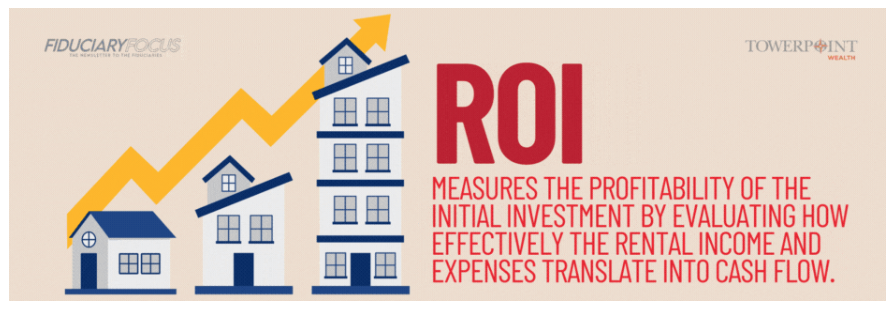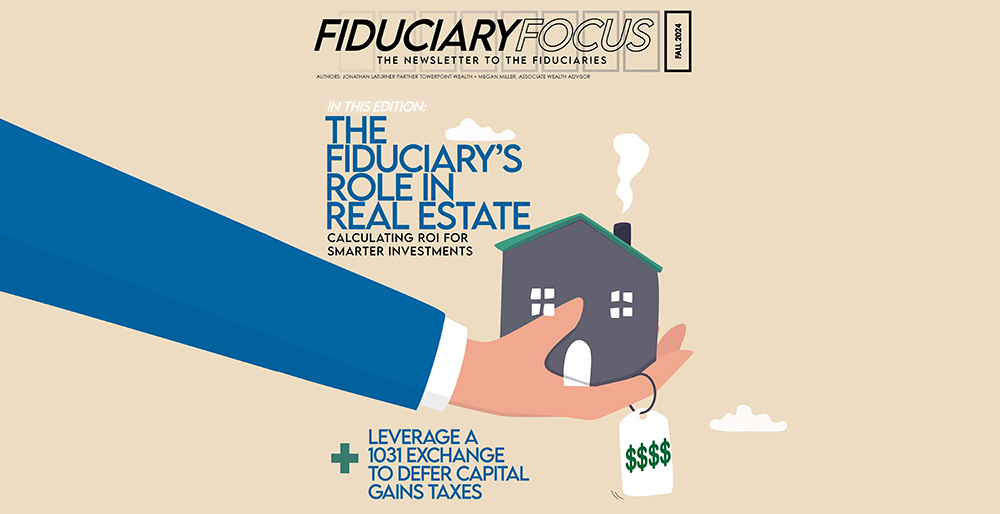Welcome to the Fall edition of Towerpoint Wealth’s Fiduciary Group’s Newsletter – Fiduciary Focus!
As fiduciaries, we recognize the importance of safeguarding our clients' assets. Our goal is to equip you with the insights and tools you need to navigate the complexities of Trust Administration, Special Needs Planning, Conservatorships, and Estate Administrations with proper expertise and care.
The Fiduciary Group at Towerpoint Wealth leverages a combined 27 years of experience to advise professional private fiduciaries, third-party trustees, conservators, administrators, and family members through their fiduciary responsibilities.
Most importantly, as an independent Registered Investment Advisory firm, we are bound by the same fiduciary standards as the fiduciaries we work with. We are committed to providing you with guidance that helps you fulfill your duties per the binding guidelines of the Uniform Prudent Investor Act and California State Probate Code.
Subscribe today to the Fiduciary Focus quarterly newsletter to stay informed and enhance your financial management knowledge. Our friendly and informative newsletter provides financial tips, updates on upcoming events, and recent releases. Delivered directly to your inbox, it’s a simple way to stay up to date with the latest insights and tools to support your fiduciary duties.
How Fiduciaries Can Help Clients Evaluate Rental Property Profitability
One of our key responsibilities as conscientious fiduciaries is ensuring that we are making informed decisions for our clients that align with their long-term financial goals.
Real estate, particularly rental properties, is increasingly seen as a lucrative wealth-building strategy; however, with opportunity comes complexity, so it’s the fiduciary’s role to navigate the complexities of determining whether rental property investments are truly worthwhile on behalf of their clients.
In this newsletter, we’ll discuss how to calculate the return on investment rental property (ROI and ROE) for clients’ rental properties and provide a Rental Property Analysis Calculator that you can use to evaluate a property's cash flow characteristics.
Understanding the Basics of Returns on Rental Properties
For fiduciaries managing rental properties on behalf of their clients, it's crucial to go beyond just evaluating rental income. When looking at how to calculate the return on investment rental property, a true analysis of the property’s return requires looking at both Return on Investment (ROI) and Return on Equity (ROE).
ROI measures the profitability of the initial investment by evaluating how effectively the rental income and expenses translate into cash flow. This is often calculated based on the amount of money initially invested, such as the down payment and closing costs.

However, as the property appreciates over time and the mortgage is paid down, the client's equity in the property grows. This is where Return on Equity (ROE) becomes a much more important metric to assess. While the ROI might remain stable, the ROE could diminish over time if the property’s cash flow isn’t growing at the same rate as the equity.
Fiduciaries should regularly evaluate the ROE to determine whether the client's increased equity is being effectively leveraged, or if it may make sense to invest that equity elsewhere.
A property with high equity but low cash flow might not provide the best long-term returns, especially compared to other investment opportunities like stocks or bonds that don’t require active management. By keeping an eye on both ROI and ROE, fiduciaries can make informed decisions about whether to continue holding the property or reinvest the equity elsewhere for better returns.
Factors that Influence Rental Property Returns
Several variables affect the returns of a rental property, and fiduciaries are well-positioned to make these decisions for their clients. These include:
- Initial Investment Costs: These consist of the property's purchase price, closing costs, renovation expenses, and any other fees required to get the property rental-ready.
- Ongoing Expenses: Maintenance, repairs, property management fees, insurance, and property taxes are all factors that can eat into profits if not accounted for correctly.
- Income Generation: Fiduciaries need to assess rent received, occupancy rates, and the potential for rental income growth on behalf of their clients. This income must also be offset by the time costs associated with managing the property. Vacancy periods, rental market fluctuations, and tenant turnover will also impact income.
- Market Conditions: The overall real estate market and economic conditions influence the appreciation of the property and its future resale value.
- Time Investment: The time cost associated with managing rental properties. Unlike passive investments such as stocks or bonds, which require minimal time and oversight, rental properties often come with an active management requirement. For professional fiduciaries billing hourly, this time can add up and impact the overall return for the client.

Working through these components ensures that decisions are made based on solid data rather than optimism or market trends alone. As fiduciaries, analyzing all of these factors enables us to fulfill our duty of care and make sound, long-term investments.
Why Accurate Rental Property Analysis is Key to Long-Term Success
One of the most significant challenges in investing in real estate is avoiding the temptation to base decisions on short-term market hype or incomplete data. As fiduciaries, we have not only the ability but the responsibility to ensure that our analysis is accurate and aligned with our client’s overall financial objectives.
By performing a thorough rental property analysis, professional fiduciaries can avoid costly mistakes and make informed decisions for their clients.
Proper analysis helps fiduciaries determine whether the property will enhance or hinder their clients' wealth-building initiatives. Fiduciaries play a critical role in forecasting the impact of real estate investments on overall retirement, tax planning, and overall portfolio diversification goals.
Need help analyzing a property’s profitability? Check out our Rental Property Calculator! Just enter the details of the real estate, and our calculator will help you qualify your client’s property as a real estate investment.
2023-2024 Tax Season Tip

Leverage a 1031 Exchange to Defer Capital Gains Taxes
When fiduciaries are considering selling an investment property for a client, one of the most effective strategies for deferring capital gains taxes is utilizing a 1031 exchange.
Named after Section 1031 of the Internal Revenue Code, this provision allows investors to defer paying capital gains taxes if they reinvest the proceeds from the sale of one investment property into another like-kind property.

The key benefit of a 1031 exchange is that it preserves your clients’ capital, allowing them to continue growing their real estate portfolio without an immediate tax hit. By deferring taxes, clients can potentially reinvest more capital into a higher-value property, thereby increasing their potential for future cash flow and appreciation.
It’s important to note that the IRS has strict rules regarding 1031 exchanges.
It is important to note, however, that there is a 1031 exchange timeline that must be followed for investors to qualify.
To qualify, the replacement property must be identified within 45 days of selling the original property, and the transaction must be completed within 180 days. Additionally, the replacement property must be of equal or greater value to fully defer capital gains taxes.
1031 Exchange Timeline

By advising clients on the benefits and requirements of a 1031 exchange, including the 1031 exchange timeline, fiduciaries can help them manage their tax liability while continuing to build long-term wealth through real estate investments.
Maximize Your Investment: Try Our Rental Property Analysis Calculator Today
Discover the true potential of your real estate investments by using our comprehensive Rental Property Analysis Calculator. By clicking here, you can easily assess the profitability of your rental property and gain valuable insights into your financial strategy. This tool helps you evaluate crucial factors such as cash flow, ROI, and other metrics to make informed decisions and maximize your investment potential. Take the guesswork out of your financial planning and unlock smarter, data-driven decisions for your rental property portfolio today.
Focus on this

Managing fiduciary responsibilities can be complex, but you don’t have to do it alone. Schedule a consultation now to learn how our fiduciary team can help you streamline your processes, stay compliant, and deliver exceptional results for your clients.
Looking for more?
Announcements & Upcoming Events
- November 7 - Thank you to those of you who attended Towerpoint Wealth’s open house event yesterday celebrating our new office space, it was a pleasure having you there!
- November 18-20th - Megan and Jonathan will be attending the Fox Rothschild Fiduciary Attorney Summit and hope to see you there!








